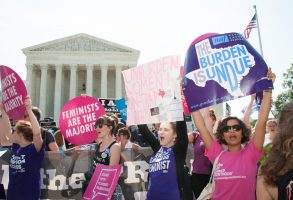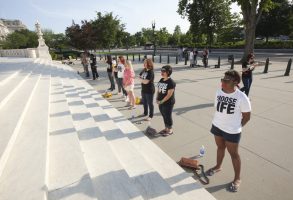Erika Bachiochi
Fellow
EPPC Fellow Erika Bachiochi is a legal scholar specializing in Equal Protection jurisprudence, feminist legal theory, Catholic social teaching, and sexual ethics. She is also a Senior Fellow at the Abigail Adams Institute in Cambridge, MA, where she founded and directs the Wollstonecraft Project. Her newest book, The Rights of Women: Reclaiming a Lost Vision, was published by Notre Dame University Press in 2021.
EPPC Fellow Erika Bachiochi is a legal scholar specializing in Equal Protection jurisprudence, feminist legal theory, Catholic social teaching, and sexual ethics. A 2018 visiting scholar at Harvard Law School, she is also a Senior Fellow at the Abigail Adams Institute in Cambridge, MA, where she founded and directs the Wollstonecraft Project. Her newest book, The Rights of Women: Reclaiming a Lost Vision, was published by Notre Dame University Press in 2021, and was named a finalist for the Intercollegiate Studies Institute’s 2022 Conservative Book of the Year award.
Ms. Bachiochi’s essays have appeared in publications such as the Harvard Journal of Law and Public Policy, Christian Bioethics (Oxford University), The New York Times, The Atlantic, First Things, CNN.com, National Review Online, National Affairs, Claremont Review of Books, SCOTUSblog, and Public Discourse. She is the editor of two books, Women, Sex & the Church: A Case for Catholic Teaching (Pauline Books & Media, 2010) and The Cost of “Choice”: Women Evaluate the Impact of Abortion (Encounter Books, 2004).
Ms. Bachiochi serves on the Advisory Boards of the Common Good Project, the Catholic Women’s Forum, the Susan B. Anthony Birthplace Museum, St. Thomas More Academy (South Bend), EthicsFinder, and the Center for the Law and the Human Person at the Catholic University of America. She is a co-founder of St. Benedict Classical Academy in Natick, MA, where she served as President of the Board from 2013–2015.
In Trump’s Court Pick, Who Won?
Erika Bachiochi
Should the President have another chance, and should that chance come in the form of the retirement of an aged Justice Ruth Bader Ginsburg, President Trump should pull the trigger and nominate Amy Coney Barrett.
Articles
CNN / July 10, 2018
A Putative Right in Search of a Constitutional Justification: Understanding Planned Parenthood v. Casey’s Equality…
Erika Bachiochi

The justices’ concerns about women’s equality are the key interpretative lens through which to understand the controversial reaffirmance of Roe v. Wade, but one which has been inadequately explored and critiqued on the part of those critical of Planned Parenthood v. Casey.
Articles
Quinnipiac Law Review / November 15, 2017
Reflections on My Time in Rome as a Speaker at the Conference Commemorating Popularum Progressio
Erika Bachiochi

The Church must prioritize the health and strength of every marriage – for who else in the world right now knows how important each and every marriage is to the development of persons and of nations?
Articles
Mirror of Justice blog / April 6, 2017
I’m a Feminist Against Abortion. Why Exclude Me from a March for Women?
Erika Bachiochi

An authentic women’s movement—one that properly extols human dignity, care, and non-violence—must be unabashedly pro-life.
Articles
CNN / January 18, 2017
Families, Schools, and Churches: The Building Blocks of a Healthy Social Ecology
Erika Bachiochi

To create a society in which human beings can flourish, we must support child-raising families, schools that intentionally cultivate the intellectual and moral virtues, and local church communities.
Articles
The Public Discourse / January 18, 2017
Safeguarding the Conditions for an Authentic Human Ecology
Erika Bachiochi

If we are to safeguard the moral conditions for an authentic human ecology we must take far more seriously the care, nurture, and cultivation of children and young people in virtue.
Articles
The Public Discourse / January 17, 2017
Embodied Caregiving
Erika Bachiochi

Modern thought has largely neglected dependency, instead touting individual autonomy and rational self-interest. If we are to recover the human person’s proper relationship with others, we must turn to thinkers who give dependency its due.
Articles
First Things - October 2016 issue / October 19, 2016
Is Hellerstedt this Generation’s Roe?
Erika Bachiochi
There is no question that the Supreme Court’s decision yesterday in Whole Woman’s Health v. Hellerstedt is a win for abortion clinics and their doctors. Whether the decision is a victory for women and for liberty, we ought not be so sure.
Articles
SCOTUSblog / June 28, 2016
Rendering the Sexed Body Legally Invisible: How Transgender Law Hurts Women
Erika Bachiochi
The gross misappropriation of executive power to utterly remake the meaning of very basic legal terms threatens not only the structure of our government, it threatens the rule of law itself. This distortion of legal language is a particular threat to laws concerning women.
Articles
The Public Discourse / May 26, 2016
Abortion and the Supreme Court’s Misguided Notions of ‘Autonomy’
Erika Bachiochi

It is high time that the Court abandon the fiction that abortion serves women’s dignity and equality.
Articles
National Review Online / March 1, 2016
A Matter of Interpretation
Erika Bachiochi
As the nation grieves the passing of a great jurist, it’s worth taking a close look at the precise contours of Justice Scalia’s towering contribution to statutory and constitutional interpretation.
Articles
Mirror of Justice / February 17, 2016
Feminism and Abortion: What Would Susan Say?
Erika Bachiochi
Equality arguments for abortion rights are so commonplace today that perhaps we don’t see the tragic ironies as our forbearers, Susan B. Anthony and Elizabeth Cady Stanton, would have seen them. The suffragists presumed that the evil of abortion would be abolished by the elevation of women; today’s feminists assert that women’s elevated status depends upon the right to sacrifice the vulnerable.
Articles
New Boston Post / January 25, 2016